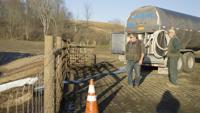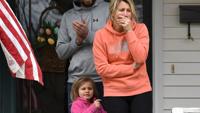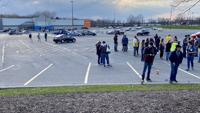Marie Romero didn’t want to watch her father’s funeral from a laptop, more than 1,000 miles from the service. But, due to statewide shutdowns of businesses and large gatherings amid the coronavirus pandemic, it was the next best thing to being there.
‘Thank God we have technology’: Cayuga County residents grieve from afar during pandemic – Auburn Citizen
‘Thank God we have technology’: Cayuga County residents grieve from afar during pandemic
The April 7 funeral of 59-year-old Vincent C. LaPorta Jr., a lifelong Auburn resident who died due to reasons not related to COVID-19, had a strict attendance limit and was viewed through a livestream by out-of-state family members who were quarantining to limit the spread of the virus.
Their story is one example of how the coronavirus pandemic has disrupted the traditional support system for grieving people — from banning religious services and physical touch at funerals to the closure of florist shops and restaurants where family and friends can gather together. But through the added pain to the grieving process, families are still finding ways to support each other as they say goodbye loved ones.
LaPorta’s three daughters, who live in Florida, were facing the possibility of two weeks in quarantine if they made the 24-hour drive to upstate New York or attempted to catch a flight at a time of high tension across the country, when the pandemic was starting to hit the East Coast in earnest.
While arranging the funeral service, LaPorta’s family used technology to keep connected and make decisions. From her home where she was quarantining in Florida, Romero and her sister helped pick out their father’s suit and casket over a video conference and with the help of pictures.
LaPorta’s nephew, Jeffrey Emmette, runs an online radio show in Auburn and offered to use the technology to livestream the service for the people who couldn’t attend — an idea LaPorta’s sister, Rosemarie Murphy, said she was all for, especially for the benefit of her nieces in Florida.
“It was the best we had to hope for,” said Murphy, who lives in Auburn.
Going forward with a funeral service under New York State on PAUSE regulations means no more than 10 people can attend and everyone must stand six feet apart from each other to practice social distancing.
That also meant hugging wasn’t allowed. “You couldn’t hug anybody. You’re watching people cry and there’s nothing you can do. You can’t comfort them,” Murphy said.
Jerry Pettigrass, the director of Pettigrass Funeral Homes in Auburn, laid down roses on the casket for each of LaPorta’s daughters who couldn’t be there in person. The physical limitations have been challenging for Pettigrass, who said he hasn’t been able to express as much compassion as he’d like to.
“I’m a very affectionate person, where I like to hug people, give them kisses on the cheek, shake hands. That’s taken away like part of my personality,” he said.
Once the service was over, Romero and her relatives stayed online to reminisce about the old days like they were able to do in-person at the last funeral they all attended for their grandmother.
“Thank God we have technology because if it was back when the Spanish Flu hit, you couldn’t do these things,” Romero said.
Another struggle for families like those of LaPorta are the visitation bans at hospitals, which leave loved ones to rely on phone calls and FaceTime to say their goodbyes.
Murphy was restricted from visiting her brother while he was hospitalized. “It was heartbreaking,” she said.
Murphy recounted how she and her family could get in touch with him on his cell phone until he was transferred from Auburn Community Hospital to Syracuse. Then they relied on nursing staff to communicate with him by phone in the intensive care unit. LaPorta was hospitalized in early March and died April 4, which meant for multiple weeks he couldn’t have visitors.
“It’s hard because you want to be there. You want to be next to him. You want to be holding his hand. And that’s all you can do is talk to people you don’t know,” Murphy said.
Romero said she had been going back and forth over whether she could travel to New York State safely or whether she’d even be let in when she got there. “People really didn’t want people leaving their state,” she said.
She recalled not being able to be there on the last day and, beginning to choke up, “not being able to hold his hand and tell him how much I loved him and what a good dad he was.”
While virtual tools are helpful, local funeral home directors say most families are opting in the midst of the pandemic to postpone services and celebrations of their loved ones’ lives until a semblance of normalcy returns to everyday life — whenever that may be.
Brew Funeral Home has been holding intimate services and limiting it to immediate family members, Director Sam Darling said. Though some families have talked about using live streaming technology, Darling said the number of services he’s held in general have decreased. Many people are choosing to have direct cremations or burials with a religious ceremony, funeral service or celebration of life held after the pandemic has passed.
But Darling said some people have been pleasantly surprised that they’re even able to say their goodbyes at the funeral home.
He can see how difficult it is for some families to absorb how little can be done in terms of a service while the limitations are in place. “After you get past 10 people in most rooms, social distancing doesn’t work,” he said. “So it makes it extremely limited in what can be done.”
Barbara Herbert Langham, director of Langham Funeral Home, said one of the biggest changes since the coronavirus pandemic has been seeing only one or two people come into the home to make arrangements for their loved ones. She said they’d welcome FaceTime, photography or even Zoom video conference technology, though she hasn’t seen it being utilized with her services yet.
She noted there’s usually a lot of embracing or even just handshakes during the grieving period that can’t happen anymore. “We’re all going through a really difficult time and my heart aches for those that are dying alone without their family members,” she said.
Herbert has also noticed most families are electing to do a direct cremation or burial for their relative and plan to do an unrestricted service or celebration of their life at another time.
LaPorta’s family also intends to hold a celebration of his life when everyone can meet in person.
Romero said she doesn’t hold hard feelings about the travel and social distancing regulations that prevented her from traveling to Auburn for the funeral and or her father’s hospitalization. She works at a popular establishment that sees a lot of elderly customers and would hate to think “because we didn’t do what we were supposed to do” that they might become ill or die.
“I’m not mad about it and I understand it. I’m a very reasonable person. But my dad would’ve wanted me there. I know that,” she said. “It just hurts more than anything.”
Staff writer Mary Catalfamo can be reached at (315) 282-2244 or mary.catalfamo@lee.net. Find her on Twitter @mrycatalfamo.
















